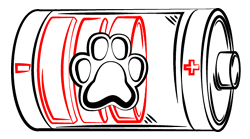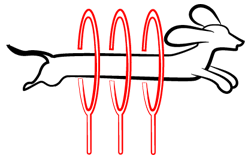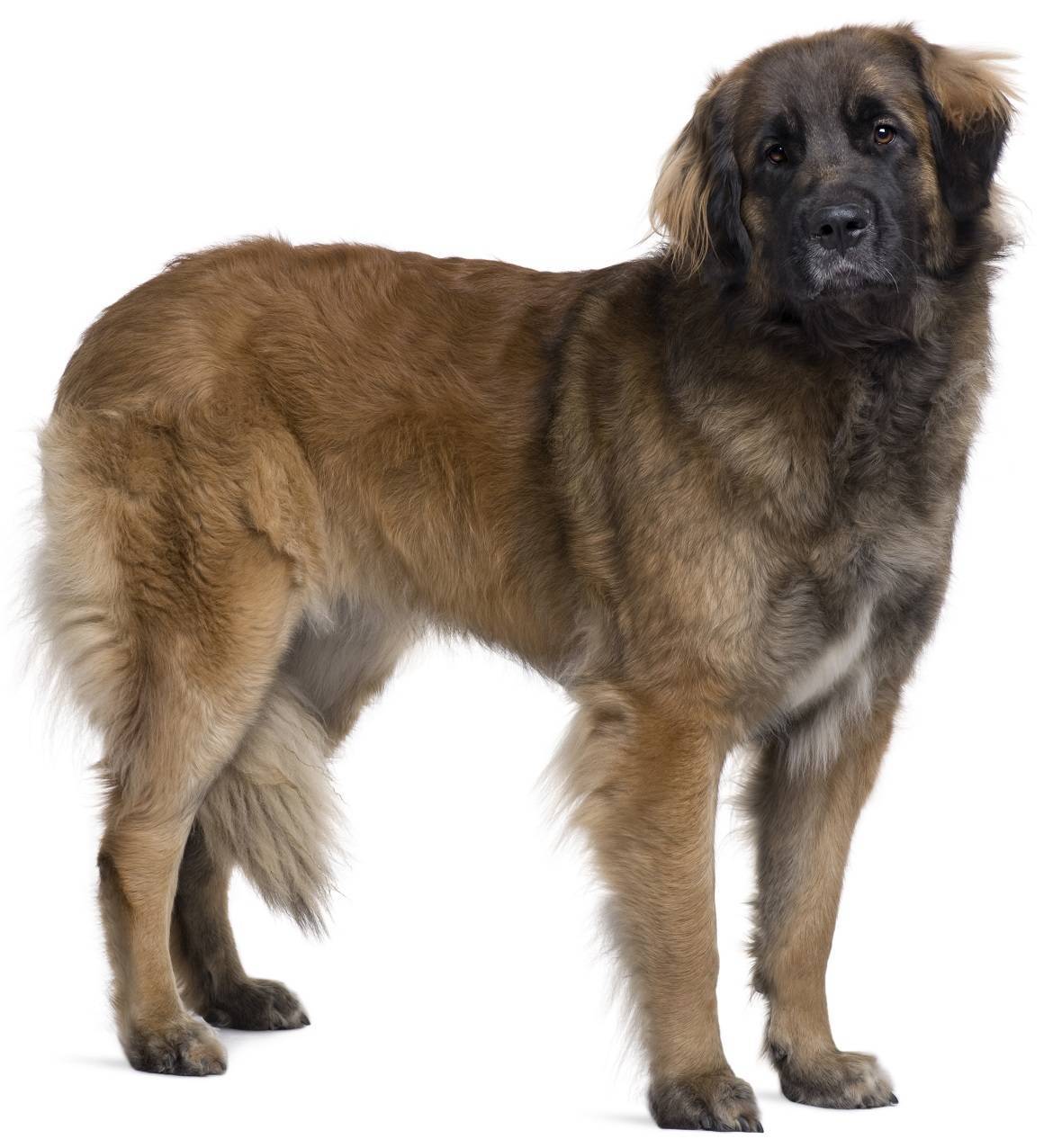
Paws ‘N’ Pups Quickview
Size
| Energy Level
| Trainability
| Paws ‘N’ Pups Rank
|
Characteristics
| Physical Characteristics: Height: 26-31” Weight: 90-160 lbs. Energy Level: Moderate – High | Colors: The American Kennel Club recognizes the Leonberger in the following colors:
The Leonberger is usually found with a black mask. |
| Health & Longevity: 7-10 years Breeders screen for the following conditions:
Like many large, deep chested breeds, Leonbergers are susceptible to gastric torsion (bloat), a life-threatening condition if immediate veterinary intervention is not sought. Osteochondrosis Dissecans (OCD), a painful condition caused by improper growth of the joint cartilage, is also seen, and may require surgical repair. During periods of growth, some Leonbergers experience Panosteitis, commonly referred to as “growing pains”. It is usually self-limited but the discomfort produced can range from mild to severe. Perianal fistulas are sometimes seen. | |
Temperament & Train-ability
Originating in Germany as a multi-purpose working breed, the Leonberger is a noble, powerful dog. Bolder and more athletic than most giant breeds, the Leo as they are affectionately nicknamed, is best suited to active, outdoorsy people with some previous dog experience. The Leo remains quite a boisterous puppy until 3 or 4 years old; training must begin early and continue through his long adolescence. Make no mistake; though some can settle into laid-back adults, may Leos retain a high energy level and require substantial daily exercise to avoid problematic behavior. An under exercised, lonely or bored Leo will be quite destructive and loud. They insist on being part of the family and are affectionate to family members, though a bit standoffish and suspicious of strangers when mature. Leonbergers love cold weather, but should never live outside alone; they must be by their beloved people. Some Leos can be dog aggressive, especially to members of the same sex. Leonbergers are unsuited to living in apartments, condos, or small yards; they also suffer in high heat. The imposing size and substantial bark of an adult Leonberger makes for a good watchdog.
Clean freaks and fussy housekeepers will want to consider another breed; Leos are well known for their messy features. Their profuse coat and substantial paws transport all manner of leaves, twigs and dirt into your home and onto your sofa. Dealing with this is part of everyday life with a Leonberger. Leos LOVE the water, and will eagerly accept any opportunity for a swim. If an outdoor option isn’t available, their water bowl will suffice; it is common for Leos to play with gusto in their bowls, which can leave the kitchen floor in a constant state of wet. While most Leonbergers are not prone to drooling, this does not stop them from depositing their last mouthful of water into your lap with great regularity. They’re big and clumsy, making them inappropriate for toddlers and the elderly who may not have good balance. While Leonbergers make great family dogs for those with older children, family arguments upset them, and they may feel the need to referee. They also love to dig, so many owners designate a preferred spot in the yard for excavation.
Leonbergers will need early and continued socialization for first few years of their lives to help them mature into confident adults. While a bit strong willed,
Leos respond well to positive reinforcement methods, but are likely to push back from force-based techniques; they have a sensitive side that is easily shut down. There are many jobs a Leonberger is well suited for, such as search and rescue, therapy, water rescue, tracking, sledding, carting and weight pull. Many have competed successfully in agility and some in obedience.
Grooming
Leonbergers carry a heavy double coat; the straight outer coat tops a dense, woolly undercoat. Weekly or twice weekly brushing will keep the coat mat free. While Leos are moderate shedders most of the year, twice a year, in spring and fall, the coat will “blow”; the coat is shed out for new coat to come in, and will come off the dog in clumps. Daily brushing will be required during these times to keep them mat-free. Many owners opt to take advantage of professional grooming services to brush and bathe their Leonberger; this can be done 2-4 times a year.
Breeders caution against shaving a Leonberger; contrary to popular belief, this does not serve to make the dog cooler in hot weather, but quite the opposite. The outer coat insulates from environmental heat, so as long as the shed undercoat is removed, the dog will be more comfortable with the outer coat left on. The other issue that can develop from shaving a double-coated dog is the risk of clipper alopecia. This condition causes the hair to come back in patches – if it comes back at all. It can take a year for the coat to come back after being shaved only once, but sometimes only patches come in.
Ears should be kept clean and dry. Toenails should be trimmed; even if your Leonberger wears their nails down, you will want to maintain the ability to handle their feet, especially useful as they age, when wear to the nails typically slows down. Teeth must also be checked and cleaned regularly.
Diet
The amount of food a Leonberger will require can vary depending on age, activity level, and type of food fed; average feeding amounts will be 7-10 cups per day, fed in two meals per day. Free feeding should be avoided, as some Leonbergers are prone to becoming overweight, and this puts the dog at risk of many health problems. A portion of your dog’s daily food can be used when training to avoid overfeeding. A high quality food should be fed, preferably one formulated for giant breeds. Many breeders recommend elevating food and water bowls. A constant supply of fresh, clean water must always be available.
Looking for a Leonberger?
 Find A Leonberger Breeder |  Leonberger Puppies For Sale |  Adopt A Leonberger |
Cost
Prices for Leonbergers generally run around $2,000, give or take several hundred dollars. Breed rescue organizations are another option, where lovely dogs needing a home can be found; adoption fees vary widely, but are generally in the $200-$500 range. Whether you acquire a dog from a breeder or rescue, do your homework to be assured that the temperaments of the dogs are tested and sound. Ongoing expenditures include the typical supplies, food, and regular vet visits.
Ongoing expenditures include the typical supplies, food, and regular vet visits. Remember, too, everything costs more with a large dog; beds, the amount of food needed, as well as veterinary procedures. Don’t forget to consider whether your vehicle can safely accommodate an adult Leonberger.
Paws ‘N’ Pups Ranking
Paws ‘N’ Pups ranks every breed out of 4 with 1 being easiest to integrate into your life and 4 being the toughest – The lower the ranking the better.
Ranking takes into account a few basic factors such as cost, skill level needed, high vs. low maintenance, and how critical regular training is to success. The Leonberger rates a 3.5; their high price tag, need for exercise, stimulation, companionship and grooming needs make them a challenging breed to own and care for.
Breeds Similar To Leonberger
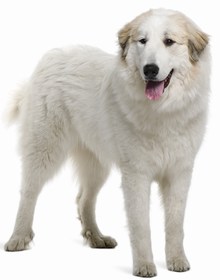 Great Pyrenees | 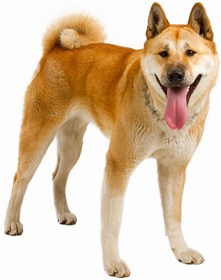 Akita | 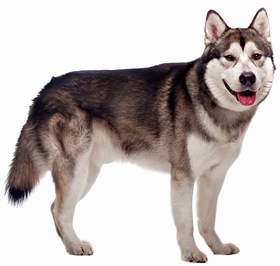 Alaskan Malamute | 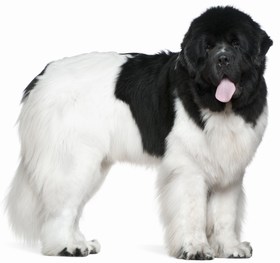 Newfoundland |


